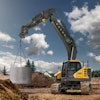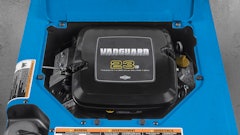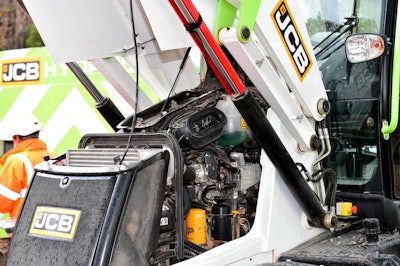
The Association of Equipment Management Professionals (AEMP) held the CONNECT 2023 event at Westgate in Las Vegas, Nevada. During the event, Chris Giorgianni, vice president government and defense and product and marketing at JCB, presented a session titled “Hydrogen’s Role in the Future of Heavy Equipment”. The session highlighted the benefits and applications of hydrogen combustion engines for construction work vehicles.

Below are some takeaways from the session at AEMP CONNECT 2023.
Hydrogen Fuel Cell vs. Hydrogen Combustion Engine
Hydrogen fuel cell and hydrogen combustion engine are the two options for utilizing hydrogen power on jobsites. The two options differ greatly in the way they use the energy. The benefits of hydrogen fuel cell include zero emissions, quick refueling and low noise. However, the nascent technology is very costly. On worksites, hydrogen fuel cell powered vehicles are less resilient to debris and dust – which are common elements on construction sites. The machines also have “complex cooling demands” according to Giorgianni’s presentation on hydrogen combustion engines at AEMP CONNECT 2023. Hydrogen fuel cell also require batteries to support various vehicle functions.
Let’s now look at hydrogen combustion engines. Like hydrogen fuel cell, hydrogen combustion engines offer zero emissions. The engine components are like traditional diesel engines found in today’s construction vehicles, minus the hydrogen fuel tank. This makes the transition easier from a maintenance and form factor perspective. When it comes to performance, the technology can match the torque and power of diesel engine powered work vehicles. Performance is also comparable to diesel on a $/kW basis.
“For the time being, JCB has come to the conclusion that fuel cells are too expensive, too complicated and not robust enough for construction and agricultural equipment. In challenging the JCB engineering team to think differently using technology that is around us in a zero-carbon way, the JCB hydrogen engine was born,” explained JCB in a press release.
Giorgianni compared hydrogen power with several renewable energy sources under heavy development today:
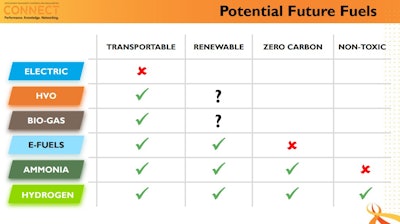
Credit: JCB
Developing Infrastructure for Hydrogen-powered Vehicles
New fuel sources require new infrastructure to support machines that rely on the energy. This is one of the main issues holding back hydrogen combustion engine adoption, according to Giorgianni. Hydrogen combustion engines are powered by small hydrogen tanks. To date, there are 72 hydrogen fueling stations in the U.S. and seven in Canada. Most stations are located on the West coast and Northeast of the country and Southern Canada. More fuel stations are needed to scale the use of hydrogen engines.
Helping drive the progress of developing hydrogen fueling stations is The Infrastructure and Jobs Act of 2021. The law has allocated $8 billion for establishing regional clean hydrogen hubs, $1 billion for Clean Hydrogen Electrolysis Program and $500 million for Clean Hydrogen Initiatives.
When it comes to reducing the cost of hydrogen fuel production, the Department of Energy rolled out the Hydrogen Shot Initiative 2021 to support such efforts.
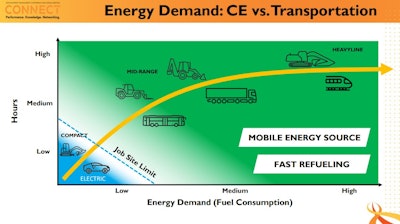
Credit: JCB
“The unique combustion properties of hydrogen enable the hydrogen engine to deliver the same power, the same torque, and the same efficiency that powers JCB machines today, but in a zero-carbon way. Hydrogen combustion engines also offer other significant benefits. By leveraging diesel engine technology and components, they do not require rare earth elements and critically, combustion technology is already well proven on construction and agricultural equipment. It is a technology which is cost effective, robust, reliable and well known throughout not just the construction and agricultural industry, but the whole world,” said Anthony Bamford, JCB chairman.


